Field trips
Advice:
Not all field trips are offered every semester. Current field trips and courses can be found under “Semester's Courses and Lectures”.
Physics and the Rhön Mountains
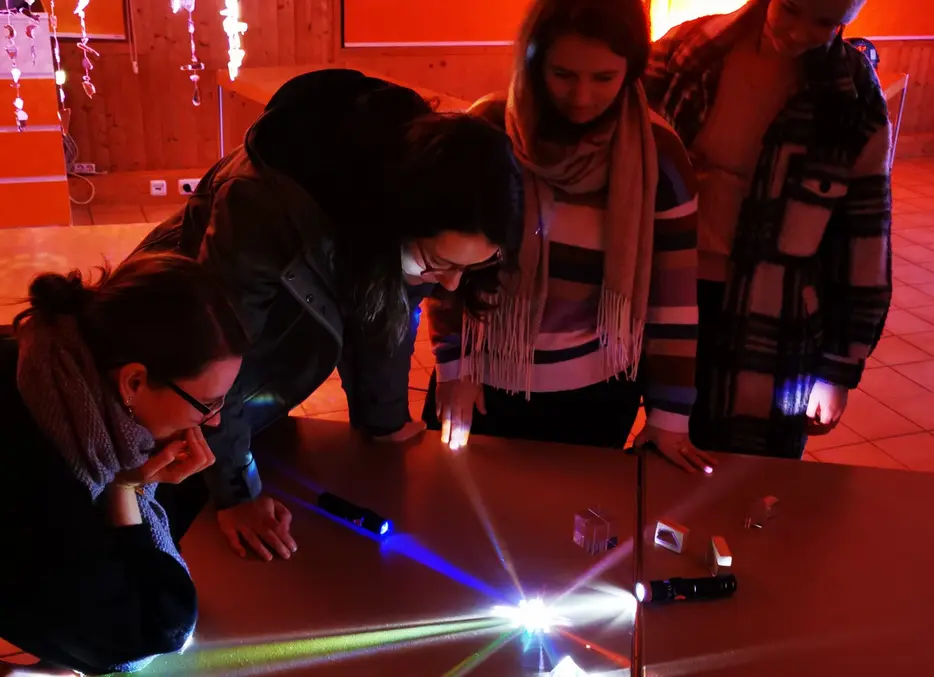
'The short excursion as part of the physics didactics seminar took us to the Franconian Rhön. We were accommodated in the Thüringer Hütte school hostel and education center run by the variado association. Among other things, the center includes the so-called Energy House, which we were also allowed to visit. On the premises, modern ways of converting, storing and saving energy are presented and discussed, questions are asked about a lifestyle that conserves the earth's resources and protects nature, and answers are sought together. The focus here is on exploring the environment, how it works, what we make of it and how we can use it without harming it. We were introduced to the "wonder world of light" and "networks" - both with a physical focus - in two interestingly prepared and self-active research blocks. We were able to gather lots of exciting ideas and suggestions for our later science lessons and experience for ourselves how well our own active, research-based activities can support learning.
The excursion culminated in a winter hike to the nearby Silbersee lake - a result of past basalt mining near Roth - where we were treated to a picturesque, frosty view of nature.
The mountain forest project
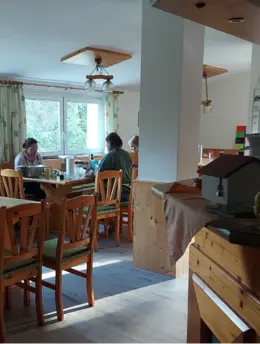
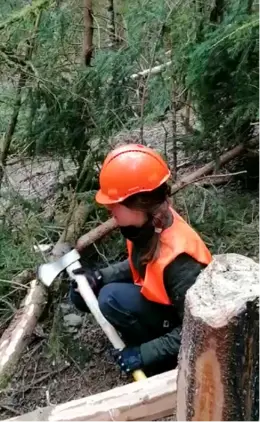
Cutting down trees for a healthy forest? From 17 April to 23 April, biology didactics students took part in the mountain forest project in Schmalkalden. Accompanied by foresters, they spent a week in a hut in the middle of the forest. In addition to plenty of good food, the students were able to experience the forest ecosystem and education for sustainable development in a completely new way. Everyone worked together to reforest the forest. This allowed the students to contribute to its natural regeneration and development, but also to help shape a forest that will serve as an example of sustainable and nature-friendly forestry in the future.
Nuremberg Zoo at night - Zoology excursion
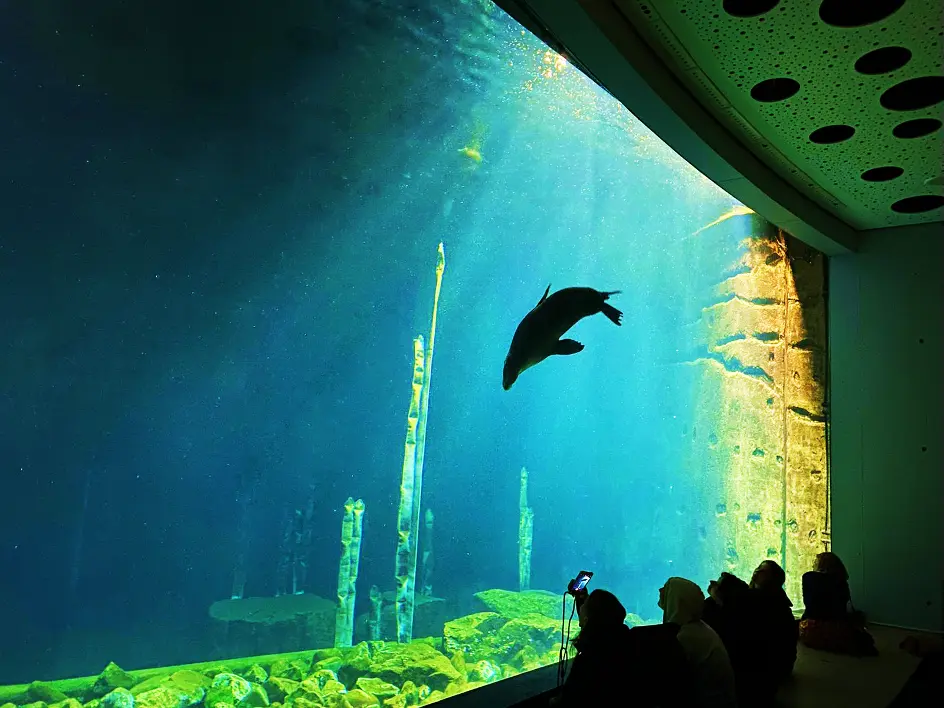
Nuremberg Zoo at night! From 18 October to 19 October, the zoology excursion took place with the biology didactics teaching students. In addition to extensive knowledge about the animals living here, but also didactic backgrounds such as the introduction to methods of behavioural observation, the students were able to gain very special insights behind the scenes of the zoo under the professional guidance of the experienced zoo educator Christian Dienemann - and not only during the day, but also at night! The night tour was particularly impressive, allowing visitors to observe animals in their nocturnal behaviour. It was fascinating to see how the behaviour of certain species changes in the dark and what adaptations they show. The overnight stay was in the Blue Salon, the dolphinarium at Nuremberg Zoo: an excursion with knowledge and impressions that will certainly remain in everyone's memory. Special thanks go to Yelva Larsen and Christian Dienemann for making this excursion possible.
Fascination poppy bee - mapping the endangered species
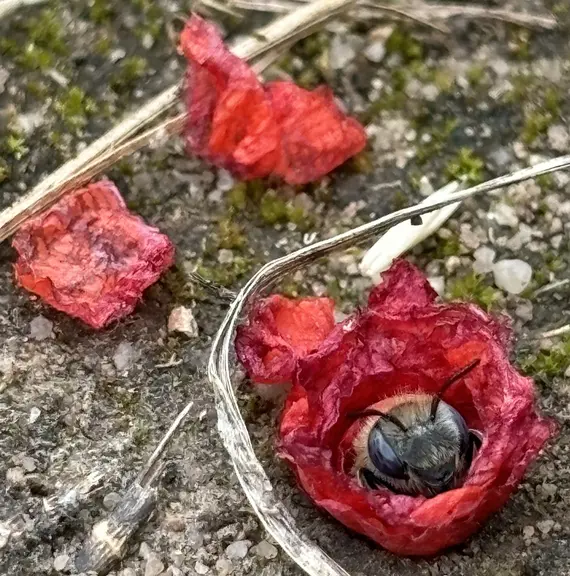
In Kemmern, Bamberg district, the poppy bee (Osmia papaveris) impresses with its remarkable behaviour and positive population increase. As part of the excursion, students from the University of Bamberg carried out a mapping campaign on 20 June 2024 and counted an impressive 352 nests - a threefold increase compared to the previous year's daily maximum!
The poppy bee is known for its unique nesting behaviour: It lines its nesting tubes with poppy flower petals and ensures that the larvae grow well protected underground. Thanks to the diverse and historically evolved landscape around Kemmern, which is characterised by near-natural agriculture, the poppy bees find ideal living conditions.
The mapping emphasises the importance of this unique landscape, which is home not only to the poppy bee but also to many other rare species. The participants experienced at first hand how valuable and worthy of protection nature is.
Experience the moor! - Forest habitat and the Red Moor in the Rhön
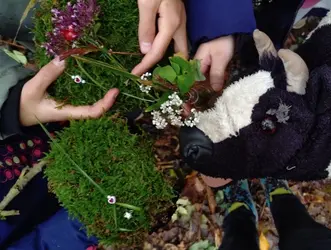
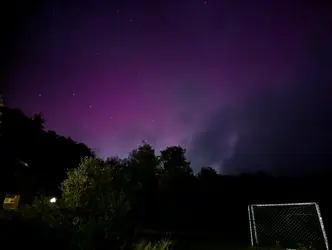
“Variado” or ”In the best school camp in the world”
The grounds of the school camp on the Rother Kuppe are located in the middle of the UNESCO Rhön Biosphere Reserve, directly in the core zone. “In the core zones, nature should develop as uninfluenced by humans as possible [...] In the Rhön, so-called cluster core zones have been designated in various forest habitat types. This protects important refuges for various endangered animal and plant species - a major contribution to the preservation of biodiversity. Human use is therefore limited exclusively to the areas of research, monitoring and education.” (Source)
And this is exactly what happens at the Variado school camp. The team ensures that these guidelines are adhered to and at the same time manages to give the children enough space on the grounds to get into action efficiently and playfully. In this way, personal development, closeness to nature, education in nature and technology can be combined with creativity, exploration and experience. During these days (09.10.2024 - 11.10.2024), we as students not only gained insights into the fascinatingly diverse program that awaited the children of the 3rd and 4th grade of the Gaustadt primary and secondary school, but were also able to actively participate ourselves. In addition, three different workshops on the topic of the forest habitat were developed in advance, which we were able to try out on site with all the pupils. The excursion was rounded off with a visit to the Red Moor, the second largest raised bog in the Rhön, where the ecological connections and the consequences of many years of peat extraction were discussed in the context of ESD. Incidentally, we also caught a glimpse of the foothills of some auroras.
From mycelium to marketing: mushroom farm “Meisterpilze”
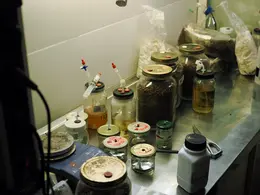
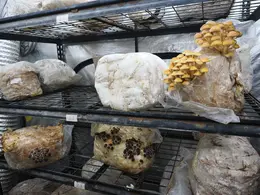
As part of the seminar “Fungi Revolution - Creating a sustainable future with a mushroom lab in the classroom” at the University of Bamberg, we visited the mushroom farm “Meisterpilze” in Erlangen on July 2, 2025. The excursion served to supplement theoretical and practical content on mushroom cultivation with an authentic insight into the professional cultivation of fine mushrooms.
After our arrival, we were warmly welcomed and given a tour of the various areas of the company. We learned about the entire production process - from the preparation and composition of the substrate to the sterilization and colonization with mycelium to the fruiting of the mushrooms. The technical infrastructure used for the controlled management of temperature, humidity, CO₂ content and light was particularly impressive. The careful coordination of these parameters is crucial for the quality and yield reliability of the different mushroom varieties, such as rose side mushrooms, hedgehog spiny beard and shiitake. A key topic of the tour was also the sustainability of production. Meisterpilze mainly uses regional raw materials and attaches great importance to energy-efficient processes. We were also given an insight into how the products are marketed directly to end customers via a weekly market stall. The openness with which our questions were answered and the practical explanations made the tour particularly informative.
For us, both lecturers and students, the excursion was not only professionally enriching, but also motivating. The visit to Meisterpilze showed how innovative and sustainable mushroom cultivation can be and what opportunities are available in this area for educational projects as well as for entrepreneurial initiatives.
Excursions
Learning to teach biology ... at extracurricular learning centres
A key problem in the education of children and young people is the increasing loss of reality and practical relevance. To counteract this, innovative didactic and methodological concepts are being developed, discussed and tested in practice. In this way, action-orientated forms of teaching/learning are being developed that guide learners to acquire specialist knowledge themselves. A modern pedagogical understanding is therefore no longer based exclusively on the teacher's activity, but actively involves learners in the process of knowledge transfer.
In this context, extracurricular places of learning are becoming increasingly important. Concepts such as ecology, systematics or evolution are initially abstract and do not directly reveal the underlying scientific relationships. These concepts can often be explained more vividly at extracurricular learning centres than in the classroom. Learners encounter the object directly, which allows them to engage with the object itself, its natural environment and the learner's life and everyday world.
In addition, with regard to exhibition and excursion didactics, central elements of teaching extracurricular learning locations are addressed. This also includes the organisation of typical school trips or day excursions. The question of which teaching/learning processes take place in informal learning locations and how they can be fruitfully organised will be explored.

